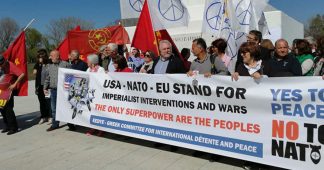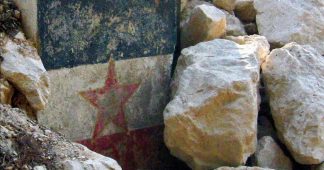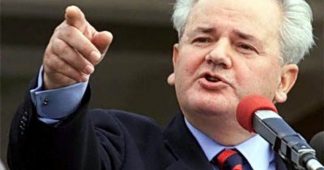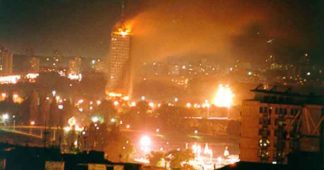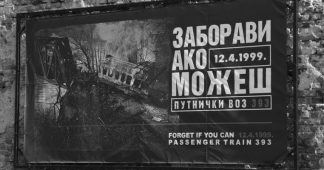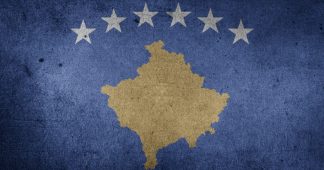In an interview with Martin Meyer and Andreas Breitenstein, Peter Handke discusses what happened in the break-up of the former Yugoslavia
22/06/2006
With Montenegro’s declaration of independence three weeks ago, the multi-ethnic experiment that was Yugoslavia has come to a conclusive end. The story of the Yugoslavia’s war of dissolution, from 1991 to 1999, has still not been settled – its causes are far too complex. Since 1996, Austrian playwright Peter Handke has taken a stance for the Serbs, feeling that guilt was assigned to them irresponsibly.
Contesting the decisive role of Serbian nationalism in the war, Handke comes more and more to the defence of Slobodan Milosevic and his regime. With the recent retraction of the Heinrich Heine Prize, Handke is back in the headlines.
Neue Zürcher Zeitung: Peter Handke, we live in “interesting” times. There have been polemical controversies and discussions about the Heinrich Heine Prize, which was awarded to you and then retracted. (more here) Now you have said you don’t want it. What do you make of all this?
Peter Handke: If I were not the one affected, I would respond emotionally – with Schadenfreude or disgust, fury or gratification. But because I’m the object of all this, I can’t. I’m calm, I feel like I’m living in the midst of a paper storm.
As the political author that you are, the outcry must have an impact. Or are you able to remain distanced?
I don’t want to be distanced. I’m not a distance person by nature. I’m someone who shapes feelings – I am moved and I want to move others. Distance is very important in literature. Maintaining the right distance from people – when am I too far, when am I too close. Of course, I’m involved. I want it to continue. I want something to open up, which is why I wrote an article in Liberation, hoping that people will return to what it is that I actually wrote. That they don’t just look at what I wrote about Yugoslavia, but that they consider how I write, my view, my rhythm. It seems to me that now we can hold a kind of discussion about the Yugoslav problem that would not have been possible before.
Why not?
With the Yugoslav problem, the walls went up immediately. There were some who knew: this is the situation, this is how we should talk about it. You can only say this and that and only in a particular journalistic style. But in the meantime, another way of speaking has emerged that is not going to disappear.
Has the understanding of the role Serbia played in the Yugoslav war changed since you first took your stance in 1995?
It’s a tragic thing. Serbia is the most lost country in Europe. You can’t say that the people are to blame for what happened. But by immediately subjecting the story to black and white logic, something went very wrong, in my opinion. There were and are other bad things, but this issue with grammatical-linguistic form was extreme; journalists think that they can write history. I am constantly being accused of wanting to write history anew, simply because I write differently. I always thought it was historians that wrote history, which is questionable enough in itself.
In order to understand Yugoslavia, don’t we have to go way back in the history, and ask how it ever came to this, look for the original constellation that gave rise to the situation that developed?
How far should we look back? You can go back to two centuries before Christ, as the Slovenes did, and say, we’re not Slavs, we’re Illyrians and therefore we don’t need Yugoslavia. History can be used for any purpose. I see Yugoslavia II beginning with Tito’s partisan army, following Yugoslavia I, which began in 1918 and ended with the German invasion in 1941. From 1941 to 1945, Yugoslavia was enslaved by the Nazis, and it was the first to liberate itself, pretty much on its own. The people of Yugoslavia can be very proud of their second Yugoslavia.
And the first one, the royal Yugoslavia?
Yugoslavia was a very complicated country. It is said that Yugoslavia was artificial from the beginning. That’s not fair. What’s artificial? Every country is artificial from the beginning. The kind of enthusiasm that the people of Yugoslavia showed in 1918, after the First World War, during which it suffered unbelievable losses, is not artificial. After the Second World War there was even greater enthusiasm among Yugoslavs for having liberated themselves. Added to that is the fact that Yugoslavia went its own political way after 1945. The movement of the non-aligned nations was targeted against Stalinist communism and American “imperialism”. But because the economy no longer functioned in Yugoslavia, all was lost. Wherever the economy doesn’t work, nationalisms arise. Brutal and aggressive. Every country looks to its own advantage.
Is it not an over-simplification to reduce the Second World War to a war of liberation for the Balkans? It was also to a large extent a civil war, in which everyone was fighting against everyone else: Ustasha (the Croatian fascists), Chetniks (the Serb royalists), communist Partisans, Bosnian Muslims, Germans, Italians… Historically, the internecine murder after 1945 was never overcome.
One has to consider that the Partisans were in all of Yugoslavia. They were also in Slovenia, Macedonia, Bosnia, Croatia and Serbia. The Partisans were Yugoslavs.
But there was first, of course, an anti-movement. A war of liberation has to be fought against something.
Against the German occupation. The Chetniks were a Serbian liberation movement and the Partisans, a Yugoslav one.
But it’s also a fact that many internal scores from before the war were settled in the course of it. Roughly half of the 1.7 million Yugoslav war victims were killed by fellow Yugoslavs. Just think of the British army’s handover of the Slovenian homeland army to Tito’s Partisans in the spring of 1945. 12,000 men who had sought asylum in Austria met their death. The same happened to 20,000 Croats in Bleiburg. They were shot right away or died on death marches.
That’s a horrible story. But it was clearly revenge against those who had allied with Hitler and Stalin, who had caused immense atrocities. They were killed out of revenge.
These crimes were taboos in the Tito-state; Partisans could only be “heroes”. But the spirit of revenge and evil lived on in the collective unconscious. After the iron brace of communism had fallen away, it was easy to be re-awakened with propaganda and provocation.
No, no. It was Hitler’s army that wrought unprecedented damage on the Balkans. The Germans had used the nationalists to murder. That was the clever thing about the Nazis. They avoided getting their own hands dirty. It’s clear to me that the revenge was revenge. As a writer I can’t say that I’m for revenge but that’s the way it must be seen.
As a writer, you stand for the opposite of revenge.
You can’t understand revenge, you can only describe where it comes from. But you can’t posit the two sides as equals. The Partisans were really freedom fighters, people who fought for Yugoslavia.
The rebirth of Yugoslavia after the Second World War has a lot to do with its need to defend itself. Is that enough to carry a multi-ethnic state into the future?
It wasn’t just that. The need to defend came more out of the enthusiasm for Yugoslavia. For a Yugoslavia beyond the kingdom, whatever that might be. That was Yugoslavia energy. I can’t imagine that it will ever die – whether you call it nostalgia or not.
What exactly went wrong later?
The economy went wrong.
In other words, the system?
The Yugoslav system was, contrary to communism in the East Bloc, a utopian system, with its model of self-determination or self-regulation of enterprise. Obviously it could only work if global import and export was functioning smoothly. The fall of the Berlin Wall made Yugoslavia a loser.
The transformation of a federal state into a federation of states could have been the solution.
Yes, but not a civil war.
At first, the Western states responded with helplessness to the war.
The cluelessness of many Western states stems from a certain long duration which defines history. It all goes back to Sarajevo in 1914. How the Islamic states responded to the disintegration of Yugoslavia relates to the long period of Turkish rule. The longue duree determines the outcome of many critical moments – that seems to be a rule of history, and a horrible one. There is a deep enmity between the peoples and this comes to the fore in particular moments. But when the economy no longer works… God help us. I love the economy. It’s part of human movement. It enlivens, it liberates, it expands. At least as a possibility. Whether it works in reality is another matter.
If Yugoslavia was failing for economic reasons, what was spark that caused the system to explode?
There were many Croats, Slovenes and Bosnians who fled the country after World War II for political reasons and who had the means to get things started again. Whether in Milwaukee or Buenos Aires – they were waiting for Yugoslavia to show a weakness. They didn’t want to spend all their lives abroad. The result is obvious today: Slovenia, Croatia and Bosnia have rightist governments. They have built up their states.
Why were these enmities so tenacious?
That’s the Balkans. If Yugoslavia as a system had continued to function as an encompassing state, they would have weakened. I have to keep returning to the economy. The downfall of Yugoslavia was, among other things, a self fulfilling prophecy. In the ten years after Tito’s death, it was hammered into them. Yugoslavia will collapse. But precisely at that time, I was aware of an unbelievable enthusiasm for Yugoslavia.
How did the government in Belgrade respond to the threat of collapse?
Serbia was the only country that could only lose in the collapse of Yugoslavia. It was the country that had large minorities in almost all the other republics. A million Serbs were living in Croatia, they made up over 30% of the population in Bosnia. That’s why Milosevic was against the collapse of Yugoslavia right till the bitter end – unlike the Croats and Slovenes. How were the Serbs supposed to react? In Croatia, the horribly anti-Semitic Tudjman was at the helm – unfortunately almost nobody in this country knows what kind of evil stupidities he wrote. And in Bosnia-Herzegovina, Izetbegovic wanted to found a theocratic Islamic state.
Even if the Muslims had wanted that, which we doubt, they wouldn’t have been able to achieve it. The Muslims wanted to hold onto the entire Bosnian state. The Yugoslav People’s Army and the Communist Party of Yugoslavia were dominated by Serbs. The general problem was that anyone in Croatia or Slovenia who opposed the communist power apparatus and demanded democracy, was automatically turning against Serbia.
That’s not true. Tudjman had pushed through a constitution that made the Croatian Serbs a minority and thus second class citizens. That’s war, is it not? What were the Serbs supposed to do? I personally would not have started a war. But it’s clear that the war was started by the physical law of action and reaction.
The problem was that Yugoslavia would have had to enact a complete economic and political system change at the same time. That’s what caused the failure of the Soviet Union as well.
The economic system change would have come. Milosevic was in the USA for a long time, he was at root a banker and a lawyer. His kind of socialism was one that served the interests of the market. We shouldn’t damn everything. And leave the Soviet Union out of it. Yugoslavia is Yugoslavia.
Milosevic and his people did everything in their power to monopolise and unleash nationalist sentiment.
Slobodan Milosevic wanted to hold onto Yugoslavia to the bitter end. Have you read a statement from him that was comparable to the nationalist baiting of Tudjman or Izetbegovic? Never. He never wrote anything, never said anything. There was the speech in 1989 on the Kosovo Field, on the occasion of the 600 year anniversary of the Serbian defeat by the Turks, where he said that the Serbs were engaged in battles and were facing battles. I think it’s malicious to interpret this as the aspiration for a greater Serbia. He says other fighting awaited – not new fighting. And anyway, that’s the only place where you can discuss what was meant. I’m convinced that he wasn’t thinking of war.
Nonetheless, Serbian nationalism and the idea of a greater Serbia became a factor that drove on the war. Ethnic cleansing was conducted on a grand scale in the name of greater Serbia, especially in Bosnia.
Where is the order from Milosevic? How can he be brought together with Srebrenica? I don’t know. By the way, Milosevic was no dictator, he was an autocrat at the helm of a semi-authoritarian regime. The press was free, television was state-run. I have no opinion about Milosevic. None. I can’t find him good or bad. I don’t want to compare him with Hitler or Ceausescu or Saddam Hussein, I find that wrong. To posit Milosevic as the big bad guy of the wars in the Balkans is an over-simplification.
You were certainly aware that going to his funeral and holding a speech would be seen as a provocation.
I know Milosevic’s hometown of Pozarevac well, it’s a beautiful city on the River Morava. The fact that the correspondent from Le Monde called it a soulless city was reason enough for me to go to the funeral. It’s true, I felt strange about it. But I thought that I’d like to see it. A year before, I had visited Milosevic in jail and his family called and asked if I would like to be there. At first I thought, no, that will be torture. But then I read in the newspapers all that hatred of a man who had just died.
One of the main reasons for your engagement in Serbia is the media, the reportage that you found massively distorted.
It’s the language. That one is not allowed to write that way about Yugoslavia. That the language is debauched with one stroke. There are journalistic articles that open the heart or fire the spirit but here, something horrible happened. When I was writing my “A Journey to the Rivers” (review), I experienced Serbia in a totally new way under the embargo. Later, people made fun of me for writing that the noodles in the Belgrade market were “off-yellow“. They were, really. It’s the country of such things.
Let’s talk about the war crimes tribunal in the Hague. You called the whole thing illegitimate.
No, only with respect to Milosevic. In the courtrooms, where the actual war crimes are at issue, they are doing good work to clarify and judge. But in the trial of Milosevic, many mistakes were made due to biases. I would have liked the trial to be held in Serbia. Unfortunately Izetbegovic and Tudjman are dead, they should also have been put on trial.
You made fun of the judges from Korea and Jamaica. They may not have been criminal justices but is it not possible that they had extremely good common sense?
That’s possible. I agree. The Koreans were the only ones who spoke out against the other two judges who wanted to deny Milosevic the right to defend himself. That allowed him to continue to act in his own defence.
Can you understand why some people take unkindly to your disqualifications?
I’m still convinced it’s not right for civil rights experts from Korea to rule on Balkan matters. You have to understand the Balkans to do that. Common sense. Whatever. There’s definitely a problem there.
But that means that you think the court in the Hague could have a positive effect.
Certainly. I thought I had made that clear. The Balkan problem is the role played by the local bosses. It’s often compared to the Hitler system but that’s a false parallel. Things were not centrally steered.
Would you support Mladic and Karadzic being delivered to the Hague?
I would not find it unproblematic, because they have already been so pre-judged. Their guilt would have to be proven. I personally would like to know what exactly the charge against Mladic is. And why, after the fall of Srebrenica, he let women and children get in buses and then disappeared for a few days. But of course: the trial has to take place. And if Mladic did what he has been accused of, then he has to be convicted.
The evidence in the case of Srebrenica seems to us to be quite clear.
There were thirty to forty Serbian villages around Srebrenica which the Muslim militia attacked when they broke out of the siege. That doesn’t mean that what happened after Srebrenica was occupied in July 1995 can be justified. It’s gruesome what the Serbs did there, the Serbian paramilitary that came from the other side of the River Drina. It’s horrible, an eternal disgrace.
In trying to explain the massacre at Srebrenica, you have mentioned the one at Kravica, in which Muslim fighters killed around 50 people, roughly a third of them civilians. As horrible as that was, it’s hard to compare it to the systematic murder of thousands of Muslim men. The murder at Srebrenica was a major logistical action. It’s not easy to kill thousands of people in a few days.
That’s true. Grotesque. But, today “relativise” has become a bad word. I relativise. I say “Srebrenica” was blind and evil revenge for the murder of over a thousand Serbs around Srebrenica in the three years before.
No one contests the crime of Kravica. But your revenge thesis seems to play it down. Revenge is situated on the affective plane. But what characterises the massacre of Srebrenica is its very scale. Perhaps it would be better to use the term hatred.
You’re not wrong there. I did experience hatred, in Kosovo. Once when I was there I asked Serbs why they hate the two million Albanians so much. They said they were angry that all this had happened after they’d done so much, even wooed the Albanians to stay in Yugoslavia. With the Albanians it’s different. I saw that in the villages, those impoverished, appallingly doleful Serbian enclaves we visited by bus. The bus was covered with Cyrillic letters. The first time a stone hit it, you could still see the humour. But when it started happening every ten minutes, it wasn’t so harmless any more. That’s hatred.
Where does that hatred come from?
I don’t know. Don’t ask me. People turn a blind eye to it.
You said the Kosovo Albanians had been wooed. But in 1989 it was Milosevic who did away with their autonomy, which was a remnant from Tito’s times. In doing so, he added fuel to the Yugoslav republics’ aversion to Belgrade, and accelerated the dynamic of disintegration. The Serbian repression in Kosovo and in Vojvodina worked in favour of nationalists in Croatia and Slovenia.
The Serbs are a generous people. Please believe that. Nowhere in Europe have so many minorities been able to live so freely as in Serbia.
Milosevic also put the screws to that in the final days of Yugoslavia.
That’s not true. It’s tragic: two million Kosovo Albanians. The Kosovo Serbs were backed into a corner for purely demographic reasons. The Albanians had bought up the land from the Serbs, and all the Serbs had left was fear. That’s why I was so impressed when I went to Pristina in 1996. Huge banners with the words “We are not alone” in Cyrillic lettering hung from windows in the city centre. The Serbs were totally surrounded.
One consequence of the Serbian massacre in the UN protection zone of Srebrenica, which took place practically under the public eye, was the NATO bombing of Serbia. The fear was rife that something similar could happen in Kosovo.
In Kosovo there was the so-called massacre of Racak. But when a journalist from Le Monde found out that a lot of that was staged he was neutralised by the Paris desk. Racak was what sparked the NATO war on March 24, 1999. But do you believe the Albanian masses really fled out of fear? When you wage war, you have to be smart. The Albanians were smart. With around 5,000 soldiers, the Serbian troops weren’t in a position to expel two million Albanians.
How would it have been possible to stop the conflict otherwise?
Ask Gerhard Schröder, Tony Blair, Javier Solana or Wesley Clark.
We’ve never been able to understand why, in taking sides with Serbia, you never showed support for the democratic opposition. That would have been sensible.
Which democratic opposition? There’s no democracy any more.
It was the autocrat Milosevic, who you continually defend, that oppressed the opposition and tried to rig elections.
What are you saying? That I support dictatorships – or what? That I’m a communist?
So you do have certain things in common with the opposition.
The term “autocrat” doesn’t describe Milosevic. He wasn’t even an autocrat in the narrowest sense of the word. He simply couldn’t control all the groups of swindlers around him. When the elections were lost, a lot of people in his party just started looking out for themselves.
Resisting a system like that is entirely legitimate.
It was a strange type of resistance. In a lot of places what we’re seeing now are Soros democrats. But for me, democracy sponsored from abroad is not a real democracy – it has to come from the people. You can’t finance democracy, and you can’t export it either.
If democracy has to come from the people, does it have a future in Serbia?
There’s no future other than liberal democracy. That is – or could be – the future. But in post-Milosevic Serbia you can’t say it had heroic beginnings. There was a pseudo revolution, if you really want to call it that. The storming of the Serbian parliament building in 2000 (timeline). And by the way: when he saw that the people were against him, Milosevic stepped down. I’m not saying all the demonstrators were funded from abroad, but a lot of them were.
We’d like to see Serbia move in the direction of freedom and democracy.
What else? Nobody wants dictatorships or autocrats. That’s over for good, I hope. But there are hidden autocracies, even in the West. So the question about my relationship to the Serbian opposition is entirely legitimate. But how should I signal my readiness? No one ever approached me. It’s typical of the Balkans that very few people attempt to talk outside their own small circle. No one manages to, not even politicians. But in fact it would be relatively easy. What’s missing is the language. Kostunica has no language. Tadic has no language. Seselj is a loudmouth.
How do you view Serbia’s perspectives?
Serbia is lost for the moment, but not forever. It doesn’t exist any more. The banks are in foreign hands. The post office, television and papers are all in German, Austrian, even Swiss hands. Serbia still exists here and there in the countryside, but Belgrade is a foreign city. Everywhere you can read “Raiffeisenbank“. “US Steel” is written across the Serbian steelworks. I’m not saying that’s a catastrophe, because the economy has to regenerate itself. Serbia is in a recovery thanks to foreign investment, and there’s work. You can’t say anything against that.
Will nationalism in the Balkans be tamed when all the new small states enter the EU one day? It seems many peoples need their defiant 19th century.
Yugoslavia was the proof that Europe could have been different. Now almost all we have is the power and dictum Europe and the moralising Europe. Yugoslavia was really a free country.
That’s hard to believe.
It was not a country of coercion, not a Stalinistic country.
But it was a country with a system that didn’t function economically.
Ultimately I agree with you there. I believe Yugoslavia ran aground on the world system. There’s nothing to be done against capitalism and the free market. I repeat: Milosevic wanted the free market, but when it came to that, the Serbs had nothing more to offer. It was too late.
To a certain extent the old Yugoslavia seems to still exist among the intellectuals who provided intellectual cohesion during the war. Authors like Drago Jancar, Slavenka Drakulik, Dubravka Ugresic, Bora Cosic and Dzevad Karahasan. Why are you excluded from this group?
I’m sorry, those are all professional ex-Yugoslavs.
It seems there’s no chance for dialogue.
Dialogue is not going to work for the time being.
Are there any Serbian intellectuals that you admire?
Sure, there are many opposition figures, but they aren’t supported by Soros. They epitomise what Yugoslavia used to be. I don’t speak with nationalists. There are a lot more nationalists than opposition figures. Serbian nationalists that have become orthodox all of a sudden – I’m not interested in that.
And Slovenia, the “ninth land” (a reference to Handke’s 1991 book “The Dreamer’s Farewell from the Ninth Land” – ed), is no longer a home for you?
Three or four years before the war, Slovenian poets started to say we aren’t Yugoslavs, we’re Central Europeans. In Croatia we’ll make a two-storey high wall against the Serbs, the Macedonians, the Muslims and the Albanians. To put it another way: my hackles rise at the way a region has been made into an ideology. So I said goodbye to Slovenia. To its poets. They’ve wreaked considerable havoc. Maybe that’s overdoing it, but I’d never have done something like that: using a region as a cudgel, using a countryside you love, where the rhythm of the language comes from, to disparage other people.
Slovenia is considered the success story among the countries of the former Yugoslavia. It’s in NATO and the EU, its politics are solid, and it is becoming more affluent.
The Slovenians were clever. They thought, we have tourism, we’re close to Austria, Germany, Italy. When money’s at stake, we don’t give a damn about Yugoslavia. I salute Slovenia, if you like. But I don’t go around waving the flag. My heart no longer swells at the thought. But maybe that’s my problem.
*
The interview originally appeared in German in the Neue Zürcher Zeitung on June 17, 2006.
Peter Handke, born in 1942 in the Austrian town of Griffen, is one of the most successful German-language authors of the post-war generation. He lives near Paris.
Published at http://www.signandsight.com/features/819.html
